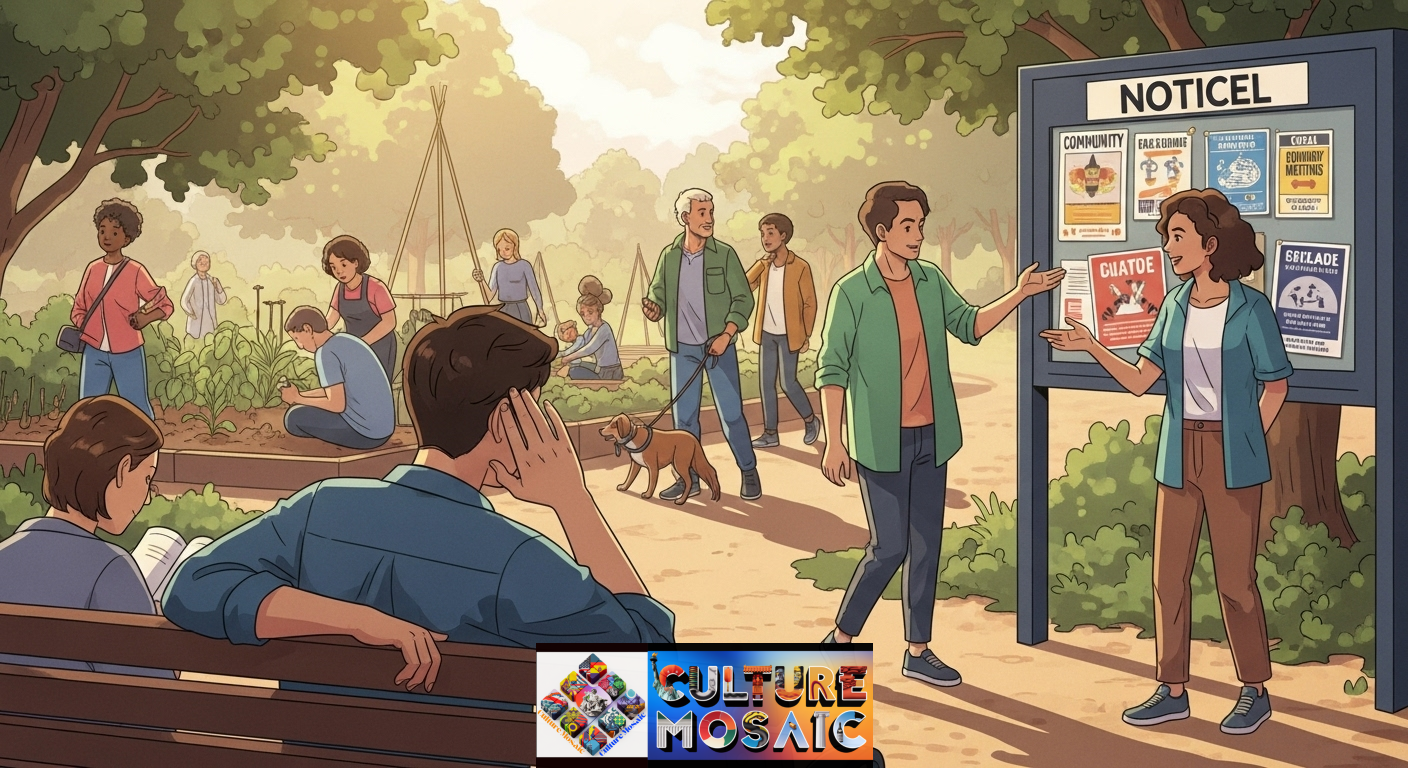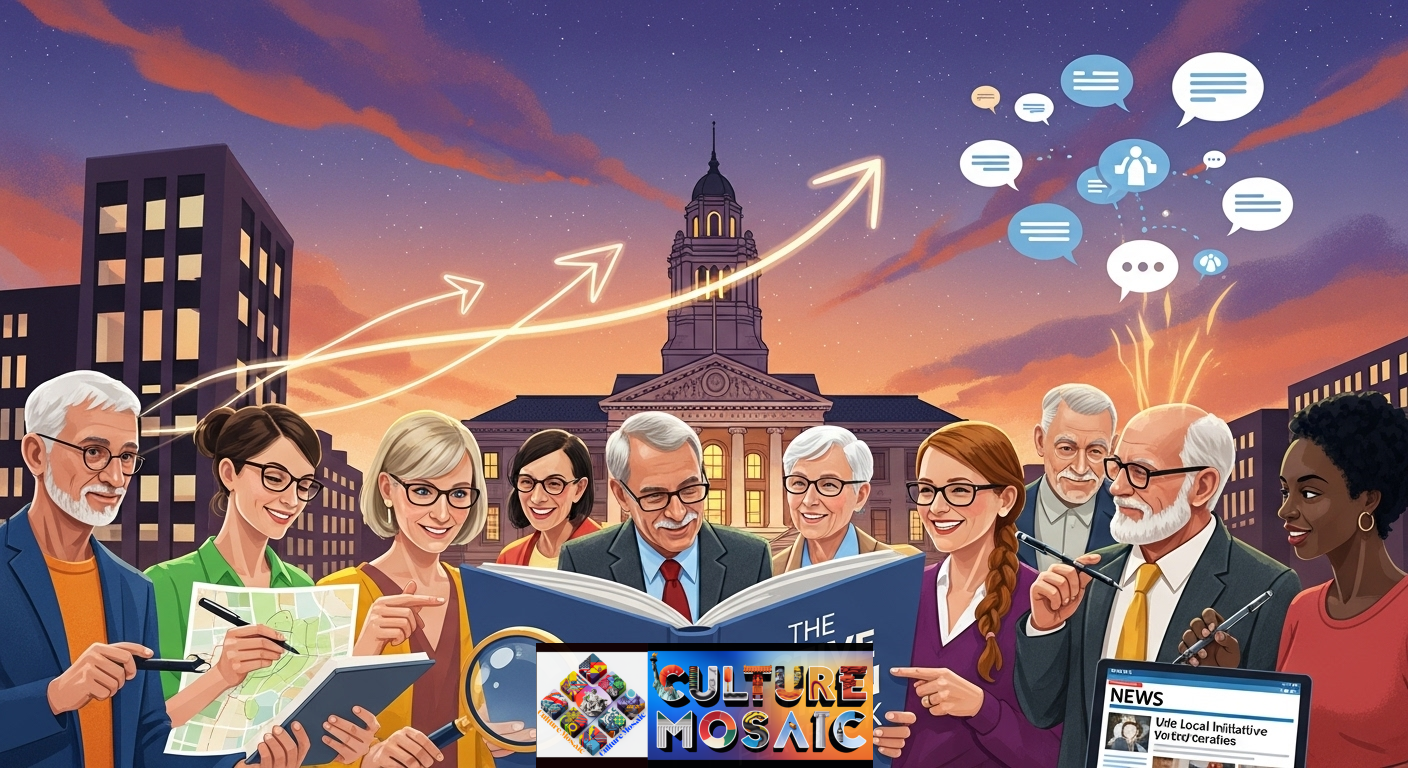Democracy doesn’t just happen during election years. The most effective change-makers understand that becoming an active citizen is a year-round commitment that starts right in your neighborhood—not in Washington, D.C.
While national politics dominates headlines and social media feeds, the decisions that directly shape your daily life happen much closer to home. Whether it’s the condition of your streets, the quality of your child’s education, or the approval of a new development project near your home, local government holds the keys to your immediate quality of life.
This comprehensive guide breaks down the essential framework for becoming an active citizen who creates meaningful impact in their community. You’ll learn practical strategies for engaging with local government, identifying the right officials to contact, and turning awareness into action.
What Makes Someone an Active Citizen?

An active citizen goes beyond voting in presidential elections. They understand how government functions at every level, engage regularly with their community, and take informed action on issues that matter to them.
Active citizenship means different things to different people. For some, it involves attending monthly city council meetings. For others, it’s organizing neighborhood cleanups, participating in school board discussions, or simply staying informed about local policy changes.
The common thread among all active citizens is intentionality. They don’t wait for problems to become crises before getting involved. They build relationships with local officials, understand the systems that govern their communities, and use that knowledge to advocate effectively.
Step 1: Local Listening: The First Rule of the Active Citizen Playbook

Before you can effectively influence your community, you need to understand what’s actually happening in it. Local listening forms the foundation of effective civic engagement and separates reactive complaining from proactive citizenship.
Why Local Matters More Than National Headlines
The Direct Impact
Local government decisions affect you immediately and tangibly. When your city council approves a zoning change, it could mean new traffic patterns on your street next month. When your school board revises the curriculum, it impacts what your children learn this semester. When your county adjusts the budget, it determines whether that pothole on your commute gets fixed this year.
National legislation, by contrast, typically takes months or years to filter down to your daily experience. The bills debated in Congress must pass through implementation phases, state-level adjustments, and bureaucratic processes before they feel their effects.
Consider a simple example: Your city council can approve funding for a new park in your neighborhood in a single meeting. That park could break ground within months. A federal infrastructure bill, meanwhile, might take three years before you see actual construction in your community activism strategies.
The Leverage Point
The average city council represents roughly 8,000 to 10,000 residents per council member. Your U.S. Representative, by contrast, represents approximately 760,000 people. This mathematical reality means your voice carries exponentially more weight at the local level.
Local government is also generally less polarized than national politics. City councils frequently make unanimous or near-unanimous decisions on practical matters like road repairs, park maintenance, and business licensing. While partisan divisions certainly exist locally, the day-to-day work of municipal government often transcends political labels.
This creates opportunities for an active citizen to build relationships across ideological lines. Your city council member is far more likely to return your phone call, remember your name, and seriously consider your input than a member of Congress.
Local Listening vs. National Noise
National news operates on conflict and controversy. Stories gain traction based on their ability to generate emotional reactions, clicks, and shares. This creates a high noise-to-signal ratio where important policy details get buried beneath partisan narratives and sensational headlines.
Local news and government proceedings, while sometimes dry, offer a much higher signal-to-noise ratio. When you read your city council’s meeting minutes, you’re getting unfiltered information about actual policy decisions. No spin, no commentary—just the facts about what your government is doing with your tax dollars.
This doesn’t mean local government is free from drama or disagreement. But the conflicts tend to be more substantive and less performative than what you see in national politics.
Where to Find Your Local Civic Information

Every active citizen needs reliable sources of information. Fortunately, government transparency laws require most civic information to be publicly accessible—you just need to know where to look.
The Official Hub
The City/County Clerk’s Website
Your city or county clerk’s website serves as the central nervous system of local government information. This single resource provides access to meeting minutes, official notices, departmental budgets, and upcoming agenda items.
Start by locating your city or county website and navigating to the clerk’s section. Bookmark this page. Visit it weekly. Most clerk websites include:
- Meeting agendas and minutes: These documents outline what topics will be discussed and what decisions were made
- Official ordinances and resolutions: The actual laws and policies your local government has passed
- Budget documents: Where your tax dollars are allocated across departments and programs
- Contact information: Direct lines to the officials and staff who can answer your questions
- Public records request forms: The mechanism for obtaining documents that aren’t already posted online
Many clerk websites now offer email subscriptions that automatically notify you when new agendas are posted. Sign up for these alerts to stay current without having to remember to check manually.
The Public Notices Section
Governments are legally required to publish certain announcements in advance of taking action. These public notices cover zoning changes, tax increases, bond measures, major construction projects, and other significant decisions.
Public notices traditionally appeared in newspapers, but most municipalities now post them online as well. Look for a “Public Notices” or “Legal Notices” section on your city’s website.
These notices might seem bureaucratic and difficult to parse, but they’re your early warning system. By the time an issue makes local news, public comment periods may have already closed. An active citizen monitors public notices to catch issues while they’re still in the proposal stage.
The Hidden Agendas
School Boards
Even if you don’t have children, school board meetings matter. School districts typically represent the single largest portion of your local property taxes. The decisions made by your school board directly impact your home’s value, regardless of whether you have kids in the system.
School boards also serve as forums for broader community advocacy value debates. Curriculum decisions, library policies, facility upgrades, and district boundaries all reflect and shape your community’s identity.
School board meetings are typically held monthly and are open to the public. Many districts now livestream meetings or post recordings online. Start by attending or watching one meeting to understand the current issues and personalities involved.
Special Districts
Most people can name their mayor and city council members. Far fewer can name the members of their water district board, fire district commission, or transit authority board—even though these special districts levy taxes, set rates, and make decisions that directly affect residents.
Special districts are local government entities created to provide specific services like water, sewage, fire protection, parks, libraries, or public transportation. They operate semi-independently from the city government, with their own boards, budgets, and taxing authority.
To find your special districts:
- Check your property tax bill for separate line items beyond city and county taxes
- Search “[your county] special districts” online
- Contact your county clerk’s office for a complete list
Each special district holds regular public meetings and publishes meeting schedules online. As an active citizen, you should at a minimum know which special districts serve your address and where to find their meeting information.
Mastering the Art of Listening

Finding information is only half the battle. The most effective active citizens develop skills for processing civic voice information efficiently and identifying what actually matters.
Meeting Attendance 101
In-Person vs. Virtual
Public meetings come in two flavors: in-person and virtual. Each format has advantages.
In-person attendance allows you to:
- Read body language and interpersonal dynamics between officials
- Network with other engaged residents during breaks
- Make your presence known to elected officials
- Participate more easily during public comment periods
Virtual attendance (via livestream or recording) allows you to:
- Watch on your schedule rather than rearranging your evening
- Skip procedural sections and focus on relevant agenda items
- Take notes without distraction
- Review complex discussions by rewinding and rewatching
As an active citizen, building your civic engagement trends, start with virtual attendance. Once you’ve identified issues you care about deeply, invest in attending relevant meetings in person.
Deciphering the Jargon
Local government operates in a language that sounds like English but often feels foreign. Here’s a quick glossary of essential terms every active citizen should know:
- Ordinance: A law passed by your city or county that applies within its jurisdiction
- Resolution: A formal statement of intent or policy by a legislative body, typically less binding than an ordinance
- First Reading/Second Reading: Most significant ordinances require two separate votes at different meetings, allowing time for public input
- Consent Agenda: A bundle of routine items voted on together without discussion (but you can request items be pulled for separate consideration)
- Executive Session: A closed portion of a meeting, only permitted for specific topics like personnel issues or pending litigation
- Adjournment: The official end of the meeting
- Tabling: Postponing discussion or action on an item to a future meeting
- Zoning: Local regulations controlling what can be built where and how land can be used
Don’t let unfamiliar terminology intimidate you. Every experienced active citizen was once a beginner struggling to follow along. Most city clerks are happy to explain terms if you email with questions.
Finding the People
Who to Contact
Mayors and city council members get the publicity, but they’re not always the best people to contact with questions or concerns. Understanding the organizational structure of local government makes you a more effective active citizen.
Elected Officials: Mayor, city council members, county commissioners, and school board members set policy direction and pass laws. Contact them about policy positions, upcoming votes, or to request they add items to future agendas.
City Manager/County Administrator: This appointed position runs the day-to-day operations of local government. The city manager typically has more practical knowledge about how things actually work than elected officials. Contact them for complex questions about implementation or to understand why something is or isn’t happening.
Department Directors: Planning directors, public works directors, police chiefs, and fire chiefs oversee specific functions. These are the subject matter experts. If you have detailed questions about a specific issue—a zoning case, a street repair, a public safety concern—start with the relevant department director.
Staff Specialists: Every department has staff members who handle specific functions. The assistant planner reviewing your neighbor’s addition, the engineer designing the new intersection, the budget analyst tracking department spending—these individuals often have the most detailed information about specific issues.
As an active citizen, build a contact list that includes both elected officials and key staff positions. When you have a question or concern, think carefully about who is best positioned to address it.
Neighbor Networks
Civic engagement doesn’t happen in isolation. The most effective active citizens build networks of informed neighbors who can share information, divide research tasks, and amplify each other’s voices.
Start with existing structures:
- Homeowners Associations: Love them or hate them, HOAs provide organized channels for communitypulse communication
- Neighborhood Associations: Informal groups focused on quality of life issues in specific geographic areas
- Parent Groups: School PTAs and booster clubs connect parents and often discuss broader community issues
- Faith Communities: Churches, synagogues, mosques, and temples bring together people who live near each other
- Online Platforms: Nextdoor, Facebook groups, and local subreddits facilitate neighborhood conversation
As an active citizen, participate in at least one neighborhood network. You don’t need to attend every meeting or participate in every discussion. Simply being connected ensures you hear about issues before they become emergencies.
Your Local Listening Action Checklist
Ready to put local listening into practice? Complete these five concrete actions to establish your foundation as an active citizen:
✅ Identify your 5 most influential local officials. Provide the names and contact details for the team members listed below:
- Your city council representative or county commissioner
- Your mayor
- Your school board representative
- One department head relevant to your interests (e.g., Planning Director if you care about development)
- One special district board member
✅ Subscribe to your City Clerk’s email list for meeting agendas. Visit your city or county clerk’s website and sign up for automatic agenda notifications. This takes two minutes and ensures you’ll never miss important upcoming discussions.
✅ Attend one public meeting (even virtually) this month. Pick any local government meeting—city council, school board, planning commission, or special district. Watch at least 30 minutes. Your goal isn’t to become an expert; it’s to demystify the process and understand how decisions actually get made.
✅ Summarize the active citizen takeaways from that meeting for a friend or neighbor.r Teaching forces understanding. After attending your first meeting, explain to someone else what happened, what issues are on the horizon, and why they might care. This conversation will clarify your own thinking and potentially recruit another active citizen.
✅ Create a simple system for tracking local issues. Start a note file, spreadsheet, or document where you track:
- Issues you’re monitoring
- Upcoming meeting dates relevant to those issues
- Officials you’ve contacted and their responses
- Actions you’ve taken
This system doesn’t need to be sophisticated. A simple Google Doc or paper notebook works fine. The act of writing things down transforms passive observation into active citizenship.
Beyond Listening: The Active Citizen’s Next Steps
Local listening establishes your knowledge foundation, but active citizenship requires action. Once you understand what’s happening in your community, you’ll naturally identify issues that demand your engagement.
The progression from observer to active citizen typically follows this pattern:
Awareness: You learn about an issue affecting your community through local listening Understanding: You research the issue, understand different perspectives, and form an informed opinion Voice: You share your perspective with decision-makers through public comment, emails, or meetings Organization: You connect with others who share your concerns and coordinate advocacy Persistence: You follow the issue through the entire decision-making process, not just the initial discussion
Every accomplished active citizen started exactly where you are now—curious but uncertain about how to make a difference. The distance between awareness and impact is shorter than you think, especially at the local level, where your voice carries genuine weight.
Local government needs more active citizens. Most public meetings draw fewer than ten residents. Most public comment periods receive fewer than five comments. Most elected officials can count on one hand the number of constituents who regularly contact them about policy issues.
This creates an extraordinary opportunity. In a system desperate for engagement, even modest participation makes you a significant stakeholder. You don’t need to be an expert, quit your job to focus on activism, or have connections to powerful people. You just need to show up consistently, armed with the local listening skills outlined in this guide.
The health of democracy depends not on occasional bursts of attention during crisis moments but on steady, sustained engagement by active citizens who understand that self-governance is a practice, not an event.
Your community needs you. Start listening today.
Frequently Asked Questions About Active Citizenship
1. How much time does it take to be an active citizen?
Being an active citizen requires as much or as little time as you can offer. At a minimum, spending 30 minutes weekly reading meeting agendas and catching up on local news keeps you informed. If a specific issue matters to you, you might invest several hours attending meetings and coordinating with neighbors. Most active citizens find that 2-3 hours monthly provides a good balance between staying engaged and managing other responsibilities.
2. Do I need special qualifications or expertise to participate in local government?
Absolutely not. Local government exists to serve ordinary residents, and your lived experience in the community is valuable expertise. While technical knowledge helps when discussing complex issues like zoning or budgets, most active citizens learn as they go. Elected officials and staff are generally willing to explain concepts to engaged residents. Your perspective as a community member is what matters most.
3. What if I disagree with most people in my community on political issues?
Local government focuses primarily on practical service delivery rather than ideological debates. Active citizens across the political spectrum find common ground on issues like road maintenance, park quality, and efficient government operations. Even on more contentious topics, local forums tend to be more civil than national political discussions. Focus on specific policies and their practical impacts rather than partisan labels, and you’ll find more allies than you expect.
4. Can one person really make a difference at the local level?
Yes, especially compared to state or national politics. Local officials represent far fewer constituents, making your individual voice proportionally louder. Many significant local policy changes have been initiated by single active citizens who identified problems and persistently advocated for solutions. Because so few residents engage regularly with local government, consistent participation makes you a recognized stakeholder whose input carries weight.
5. What’s the best issue for a new active citizen to start with?
Start with something that directly affects your daily life and that you feel passionate about. This might be traffic safety near your home, the quality of a local park, school policies affecting your children, or a proposed development project in your neighborhood. Personal connection keeps you motivated through the learning curve of understanding how local government works. Once you’ve successfully engaged on one issue, you’ll have the skills and confidence to tackle others

